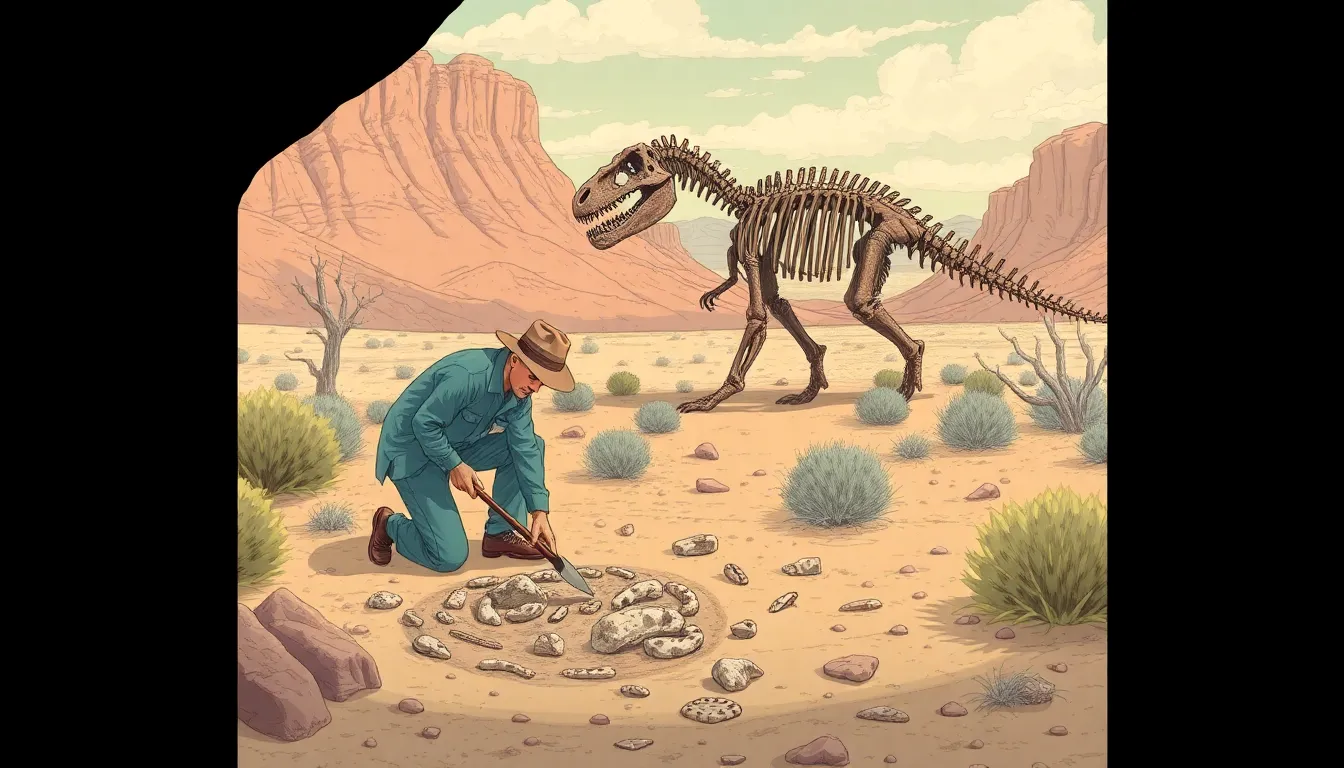Uncovering ancient history, paleontologists now understand more about the past. The recent discovery of Tenontosaurus fossils in West Texas allows us to better understand the dinosaur’s range. You’ll learn to explore dinosaur fossil discoveries and their significance, as we discuss the impact of this find.
Table of Contents
We Also Published
A recent discovery in West Texas has paleontologists excited. A team of researchers from the University of Texas at El Paso (UTEP) unearthed fossil fragments belonging to the dinosaur Tenontosaurus. This find is significant because it expands the known geographic range of this species, shedding new light on its dispersal and adaptation across North America. The fossils were found at the Indio Mountains Research Station, a natural laboratory spanning over 41,000 acres.
The Unexpected Discovery
The discovery of the Tenontosaurus fossils was serendipitous. The researchers were not actively searching for fossils when they stumbled upon the fragments. This highlights the importance of thorough fieldwork and the potential for unexpected discoveries in seemingly unrelated research. The fossils, identified as belonging to the dinosaur Tenontosaurus, were found weathering out of soft shale. The largest fragment was part of a femur, indicating that the fossils have significant scientific value.
Unearthing Ancient Bones
The paleontologists were studying the rocks in the area. The researchers noticed fragments weathering out of the soft shale. They simply picked them up. This method allowed them to collect pieces. It was an unexpected and exciting find. The family even helped collect the pieces.
Significance of the Find
The discovery is detailed in a non-peer-reviewed paper. The New Mexico Museum of Natural History and Science recently published the paper. Dinosaur fossil discoveries are rare in Central Texas. The finding of fossilized bones, rather than just footprints, is especially uncommon. The discovery extends the known range of Tenontosaurus.
Expanding the Known Range of Tenontosaurus
Prior to this discovery, the nearest known locations for similar fossils were in states like Montana, Idaho, and Arizona, as well as other parts of Texas. The West Texas find pushes the boundaries of where we thought this dinosaur species roamed. This suggests a broader distribution and adaptation of Tenontosaurus to different environments across the continent. The discovery site adds an important piece to the puzzle of how these dinosaurs dispersed across North America.
Geographical Context
The fossils were discovered in the Indio Mountains Research Station. This is about 26 miles southwest of Van Horn. The species lived during the Early Cretaceous period. This time was over 110 million years ago. This finding shows that Tenontosaurus lived as far south as West Texas.
Scientific Implications
The Tenontosaurus was a medium-sized, plant-eating dinosaur. The discovery site provides crucial data. It also provides a glimpse into the prehistoric past of the region. The team adds that it adds an important piece to the puzzle of how these dinosaurs dispersed across North America and adapted to diverse environments. This highlights the importance of fieldwork.
Future Research and Exploration
The team is now hoping the discovery will inspire future exploration in West Texas. The region is still largely underexplored for dinosaur fossils. The researchers are eager to contribute even a small piece to that bigger story. The discovery underscores the value of continued paleontological research. It highlights the importance of fieldwork and the role of dedicated researchers.
Inspiring Future Exploration
The discovery highlights the importance of fieldwork. Major discoveries can happen when we least expect them. This discovery shows that there’s still much to learn about our region’s prehistoric past. This find highlights the importance of fieldwork and the role of dedicated researchers.
The Bigger Picture
The discovery shows there is still much to learn. It is a privilege to contribute even a small piece to that bigger story. This find highlights the importance of fieldwork and the role of dedicated researchers like Dr. Ricketts. It’s also a reminder that major discoveries can happen when we least expect them.
Key Takeaways
The discovery of Tenontosaurus fossils in West Texas is a landmark event. It expands the known range of this dinosaur species. It also provides new insights into the prehistoric past of the region. This finding highlights the importance of continued research and the potential for exciting discoveries in unexpected places. The discovery shows that there’s still much to learn about our region’s prehistoric past.
| Aspect | Details | Significance |
|---|---|---|
| Discovery Location | Indio Mountains Research Station, West Texas | Extends known range of Tenontosaurus |
| Fossil Type | Fragmentary bones, including part of a femur | Rare find; provides valuable scientific data |
| Dinosaur Species | Tenontosaurus (plant-eating dinosaur) | Adds to understanding of dinosaur dispersal and adaptation |
| Historical Context | Early Cretaceous period, ~110 million years ago | Provides insight into prehistoric West Texas |
Also Read
RESOURCES
- The seven greatest dinosaur discoveries of the last 200 years ...
- Researchers Discover Dinosaur Fossil Beneath Denver Museum of ...
- Dinosaur Discoveries | AMNH
- Home - Dinosaur Discovery Site
- Dinosaur Ridge: Home
- When Did Humans First Discover Dinosaurs? | HISTORY
- Are there any dinosaur discoveries made by normal ordinary people ...
- Dinosaurs: Fossils Exposed
- Dinosaur fossil discovery | XTO Energy
- Dinosaur Park - Park and Recreation - Prince Georges County MD
- Canadian Fossil Discovery Centre – Discover Fossils
- Dinosaur hunters make “chilling” discovery deep in Canadian ...
- Smithsonian Kids: Dinosaur Fossil Hunter (Exploration in Action ...
- Big Bend Fossil Discovery
- The Fossil Discovery Trail in Dinosaur National Monument, Utah ...
From our network :
- JD Vance Charlie Kirk: Tribute and Political Strategy
- Limit Superior and Inferior
- Optimizing String Concatenation in JavaScript: Template Literals, Join, and Performance tips
- The Diverse Types of Convergence in Mathematics
- Bitcoin Hits $100K: Crypto News Digest
- Optimizing String Concatenation in Shell Scripts: quotes, arrays, and efficiency
- Limits: The Squeeze Theorem Explained
- Economic Importance of Soybeans in America: The $60 Billion Crop That Feeds the World
- Bitcoin price analysis: Market signals after a muted weekend








0 Comments